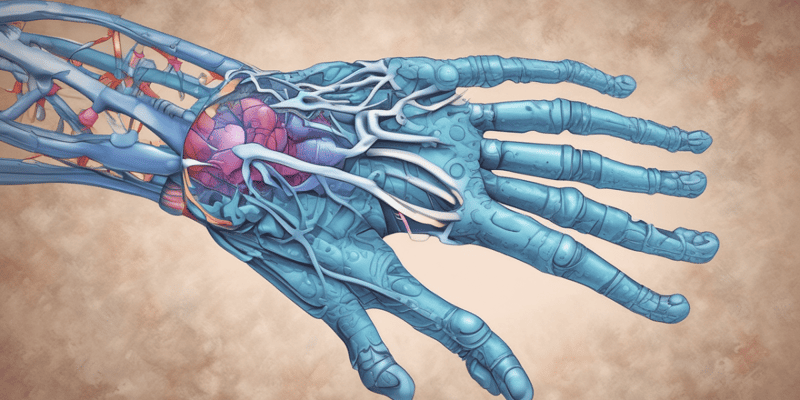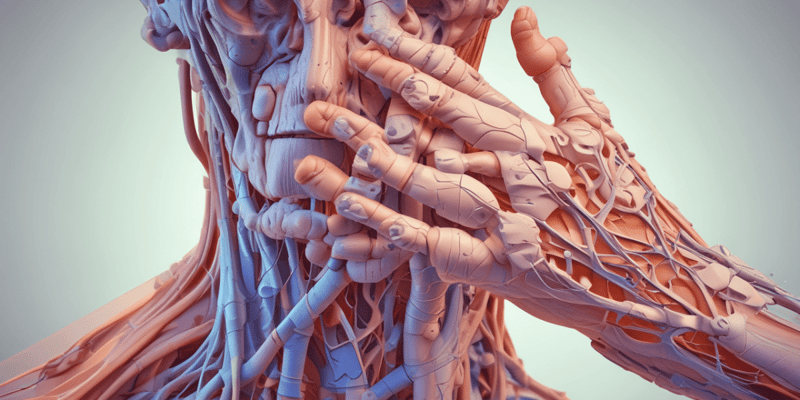Podcast
Questions and Answers
What do Disease Modifying Anti-Rheumatic Drugs (DMARDs) primarily aim to achieve in patients with Rheumatoid arthritis?
What do Disease Modifying Anti-Rheumatic Drugs (DMARDs) primarily aim to achieve in patients with Rheumatoid arthritis?
Which of the following is NOT a contraindication for the use of Methotrexate?
Which of the following is NOT a contraindication for the use of Methotrexate?
What is a key nursing intervention when a patient is on DMARD therapy?
What is a key nursing intervention when a patient is on DMARD therapy?
What common adverse reaction should a nurse anticipate in patients taking Hydroxychloroquine?
What common adverse reaction should a nurse anticipate in patients taking Hydroxychloroquine?
Signup and view all the answers
What potential risk is associated with combining Methotrexate and sulfa drugs?
What potential risk is associated with combining Methotrexate and sulfa drugs?
Signup and view all the answers
Which condition can Bisphosphonates be used to treat?
Which condition can Bisphosphonates be used to treat?
Signup and view all the answers
What is a common gastrointestinal side effect of Bisphosphonates?
What is a common gastrointestinal side effect of Bisphosphonates?
Signup and view all the answers
What precautions should men take while on Methotrexate?
What precautions should men take while on Methotrexate?
Signup and view all the answers
Which of the following is a contraindication for the use of bisphosphonates like Alendronate sodium?
Which of the following is a contraindication for the use of bisphosphonates like Alendronate sodium?
Signup and view all the answers
What is a recommended nursing intervention for patients taking Alendronate sodium?
What is a recommended nursing intervention for patients taking Alendronate sodium?
Signup and view all the answers
Which interaction is known to decrease the absorption of Alendronate sodium?
Which interaction is known to decrease the absorption of Alendronate sodium?
Signup and view all the answers
What is a common adverse effect associated with Allopurinol?
What is a common adverse effect associated with Allopurinol?
Signup and view all the answers
Which medication should be avoided in patients with peptic ulcer disease?
Which medication should be avoided in patients with peptic ulcer disease?
Signup and view all the answers
What is a potential adverse effect of Colchicine?
What is a potential adverse effect of Colchicine?
Signup and view all the answers
What should patients taking uric acid inhibitors do to help prevent kidney stones?
What should patients taking uric acid inhibitors do to help prevent kidney stones?
Signup and view all the answers
Which of the following is a serious side effect of probenecid?
Which of the following is a serious side effect of probenecid?
Signup and view all the answers
Which of the following should be done to monitor a patient's condition while they are on allopurinol or probenecid?
Which of the following should be done to monitor a patient's condition while they are on allopurinol or probenecid?
Signup and view all the answers
What is the recommended daily fluid intake for a patient experiencing an acute attack of gout?
What is the recommended daily fluid intake for a patient experiencing an acute attack of gout?
Signup and view all the answers
What should be avoided while taking skeletal muscle relaxants to prevent increased CNS depressant effects?
What should be avoided while taking skeletal muscle relaxants to prevent increased CNS depressant effects?
Signup and view all the answers
What common adverse reaction occurs with all skeletal muscle relaxants?
What common adverse reaction occurs with all skeletal muscle relaxants?
Signup and view all the answers
Which condition indicates a contraindication for using Flexeril?
Which condition indicates a contraindication for using Flexeril?
Signup and view all the answers
What should patients taking colchicine for acute attacks of gout expect in terms of symptom relief?
What should patients taking colchicine for acute attacks of gout expect in terms of symptom relief?
Signup and view all the answers
Which of the following skeletal muscle relaxants is associated with a risk of hepatic toxicity?
Which of the following skeletal muscle relaxants is associated with a risk of hepatic toxicity?
Signup and view all the answers
When taking medications like Zanaflex, what adverse effect should a patient particularly monitor for?
When taking medications like Zanaflex, what adverse effect should a patient particularly monitor for?
Signup and view all the answers
Study Notes
Musculoskeletal Drugs
- Disease Modifying Anti-Rheumatic Drugs (DMARDs) slow joint degeneration and progression of rheumatoid arthritis (RA).
- DMARDs are used when pain relief agents and anti-inflammatory drugs are no longer effective.
- DMARDs act by producing immunosuppression and also treat fibromyalgia and inflammatory bowel diseases, such as Crohn's disease.
Adverse Reactions
- Common adverse reactions include nausea, stomatitis, and alopecia.
- Be aware of skin rash, fever, easy bruising, visual changes, tinnitus, or hearing loss.
- Sulfasalazine containing DMARDs can cause ocular changes, gastrointestinal upset, and mild pancytopenia.
- Plaquenil can cause retinal damage.
Contraindications
- Methotrexate is contraindicated in patients with renal insufficiency, liver disease, alcohol abuse, folate deficiency, and pancytopenia.
- Enbrel, Humira, and Remicade are contraindicated in patients with heart failure (HF) or neurological demyelinating diseases.
Rheumatoid Arthritis (Late Stage) Deformities
- Boutonniere deformity of the thumb
- Ulnar deviation of metacarpophalangeal joints
- Swan-neck deformity of fingers
Precautions
- Women should not become pregnant while taking these drugs.
- Men should use barrier methods to prevent transmission of drug through semen.
- Methotrexate can cause thrombocytopenia and leukopenia. Liver and renal functions should be monitored every 3 months.
- Notify the physician if symptoms like mouth sores, diarrhea, fever, sore throat, easy bruising, rash, itching, or nausea/vomiting arise.
Interactions
- Sulfa drugs increase the risk of methotrexate toxicity.
- Aspirin and NSAIDs increase the risk of methotrexate toxicity.
Nursing Interventions
- Monitor labs (thrombocytopenia, leukopenia, liver enzymes, and kidney function).
- Monitor for toxicity.
- Hydroxychloroquine can cause skin rash, fever, cough, and easy bruising.
- Teach patients to take the drugs at the same time (methotrexate), to use effective birth control methods, and to report any signs of infection, bleeding, or allergic reactions.
Drugs (DMARDs)
- Adalimumab - Humira
- Etanercept - Enbrel
- Hydroxychloroquine sulfate - Plaquenil
- Infliximab - Remicade
- Methotrexate - Rheumatrex
Bone Resorption Inhibitors (Bisphosphonates)
- Actions: Inhibit normal and abnormal bone resorption, increasing bone density and reversing osteoporosis.
- Uses: Osteoporosis in postmenopausal women and in hypercalcemia of malignancy.
Adverse Reactions (Bisphosphonates)
- No drug is fully risk-free, including bone resorption inhibitors
- N/D
- Increased or recurrent bone pain
- Esophagitis, esophageal ulceration, dyspepsia, acid regurgitation, dysphagia
- Abdominal pain, nausea, diarrhea, constipation
- Musculoskeletal pain
- Visual disturbances
- Increased risk of bleeding, especially when taken with other drugs inhibiting clotting.
- Nephrotoxicity with IV infusions.
Contraindications (Bisphosphonates)
- Pregnancy and lactation
- Fosamax and Actonel - patients with hypocalcemia
- Dysphagia, esophageal stricture, or disorders, serious kidney impairment, or hypocalcemia.
Interactions (Bisphosphonates)
- Antacids decrease the effectiveness of bisphosphonates.
- Aspirin increases the risk of GI bleeds.
- Theophylline increases the risk of theophylline toxicity.
- Caffeine, orange juice, magnesium supplements, iron, and calcium decrease absorption of alendronate. Wait 2 hours between the bisphosphonate and these supplements.
Nursing Interventions (Bisphosphonates)
- Administer with 8 oz of water while the patient is in an upright position to prevent esophageal irritation. Stay upright for 30 minutes after taking the medication.
- Take first thing in the morning on an empty stomach.
- Supplement calcium and vitamin D if dietary intake is inadequate. - Clients need a bone scan every 12-18 months.
- Monitor blood calcium.
- Exercise 30-40 minutes daily (walking).
Drugs (Bisphosphonates)
- Alendronate sodium - Fosamax
- Ibandronate - Boniva
- Risedronate sodium - Actonel
Uric Acid Inhibitors
- Uses: Acute attacks of gout (colchicine); or for preventing acute gout attacks (allopurinol, probenecid, febuxostat).
- Adverse Effects:
- Nausea, vomiting, diarrhea (N/V/D) in all drugs
- Allopurinol can cause skin rash, hepatitis, and kidney damage.
- Colchicine can cause severe nausea, vomiting, and bone marrow depression, thrombocytopenia, and rhabdomyolysis.
- Probenecid can cause kidney stones and kidney problems.
Contraindications (Uric Acid Inhibitors)
- Pregnancy and lactation
- Anturane - peptic ulcer disease
- Colchicine - serious GI, renal, hepatic, or cardiac disorders
- Probenecid - Blood dyscrasias, uric acid kidney stones, and children under 2 years
Interactions (Uric Acid Inhibitors)
- Grapefruit juice - may increase side effects in colchicine
- Ampicillin leads to a possible risk of rash in allopurinol
- Theophylline increases risk of theophylline toxicity in allopurinol
- Coumadin increases risk of bleeding in allopurinol
- Penicillin increase serum levels of antibiotics in probenecid
- NSAIDs increase serum levels of NSAIDs in probenecid
- Barbiturates increase sedation levels in probenecid
- Salicylates decrease probenecid effectiveness
- Oral anticoagulants increase risk of bleeding in anturane
- Tobutamide increases risk of hypoglycemia in anturane
Nursing Interventions (Uric Acid Inhibitors)
- Patient teaching: Take as prescribed with meals and plenty of water (3000 cc/day). Maintain adequate urine.
- Monitor stool and urine for blood
- Colchicine kept on hand for acute attacks.
- See improvement within hours.
- Check joints every 2 hours for improvements.
- Take with food. Drink 10 glasses of water daily until the attack subsides.
- Monitor uric acid levels, CBC, UA, liver, and kidney function tests
- If rash develops with allopurinol or probenecid, stop drug and notify the provider.
- Avoid alcohol and foods high in purine.
- Regular exercise.
Drugs (Uric Acid Inhibitors)
- Zyloprime/Allopurinol
- Colchicine
- Probenecid
- Anturane/Sulfinpyrazone
- Uloric/Febuxostat
Skeletal Muscle Relaxants
- Uses: Acute painful musculoskeletal conditions.
- Adverse Reactions (All): Drowsiness, dizziness, UTI (Zanaflex). Diazepam, cyclobenzaprine, tizanidine - hepatic toxicity with tizanidine. Physical dependence from chronic long-term use.
- Baclofen - Nausea, constipation, urinary retention, seizures.
- Dantrolene - Hepatic toxicity, muscle weakness.
Contraindications (Skeletal Muscle Relaxants)
- Pregnancy and lactation
- Flexeril and MAOIs- not to be taken within 14 days of MAOI
- Flexeril contraindicated for patients with recent MI, cardiac conduction problems, or hyperthyroidism.
- Diazepam is a controlled substance with IV use
Drug Interactions (Skeletal Muscle Relaxants)
- CNS depressants increase CNS depressant effects.
- Flexeril and MAOIs increase the risk for seizures and fever.
- Norflex and Haldol increase the risk of psychosis.
- Zanaflex and antihypertensives may increase the risk of hypotension
Drugs (Skeletal Muscle Relaxants)
- Diazepam - Valium
- Orphenadrine citrate - Norflex
- Tizanidine - Zanaflex
- Cyclobenzaprine - Flexeril
- Baclofen
- Dantrolene - Dantrium
Nursing Interventions (Skeletal Muscle Relaxants)
- DMARDs, uric acid inhibitors, and skeletal muscle relaxants- Take with or immediately after meals to minimize GI problems.
- Skeletal Muscle Relaxants - Short-term use only (no longer than 2-3 weeks). Avoid alcohol or other CNS depressants.
Studying That Suits You
Use AI to generate personalized quizzes and flashcards to suit your learning preferences.
Related Documents
Description
Test your knowledge on the role of Disease Modifying Anti-Rheumatic Drugs (DMARDs) in managing Rheumatoid Arthritis. Identify which conditions are contraindications for Methotrexate use in this insightful quiz.




